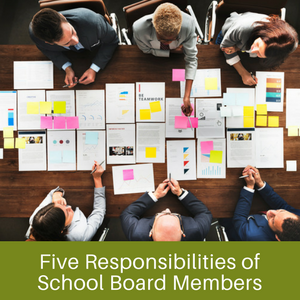Get on Board: Responsibilities
Five Responsibilities of School Board Members
The Governance Act collects in one place the responsibilities of all city and county school boards. These are all in keeping with what research shows are the hallmarks of effective boards.

1. Establish a Vision
In concert with the superintendent, establish a vision for the system by adopting goals that address student needs, advance student performance, and monitor
implementation of policies and programs by reviewing data.
It’s important to note that the board and superintendent work together as a team. You can read more about this relationship in the section titled, The Board-Superintendent Team.
2. Adopt Written Policies and Programs
Adopt written policies and programs, upon the recommendation of the local superintendent of education, to further the educational goals of the system and respond to system needs.
As a governing body, the board is neither responsible for nor involved in the day-to-day operations of the school system. The board’s policymaking role is essential to ensuring that its vision and goals have adequate institutional support.
3. Act on Personnel Recommendations
Act on personnel recommendations submitted by the local superintendent of education in a timely manner, based on student needs and system finances, without regard to personal preferences or political interests.
Legally, board members have no role in identifying or interviewing applications for system jobs. Those duties are part of the superintendent’s work.
The Attorney General of Alabama advises that school board members need only consider whether the presented applicant is qualified for the recommended position. The board does not have the authority to consider an alternate applicant.
In addition, board members cannot be involved in investigating employee conduct or push for a dismissal.
4. Consider and Approved Operating Budgets
In concert with the superintendent, consider and approve operating budgets for the system aligned with the goals and objectives of the local board of education.
The vision and goals for the school system, determined by the board-superintendent team, should be reflected in the systems’ annual budget. Additionally, the School Fiscal Accountability Act requires each school system to have a plan to maintain a minimum of one-month’s operating expenses in its general fund reserve.
5. Advocate for Public School Students
Advocate for the needs, resources, and interests of public school students and refer stakeholders and constituents to the superintendent so that these issues can be addressed by system personnel.
Odds are you are interested in running for the board because you see problems that need to be addressed. Keep in mind that the board’s role is not to solve problems.Rather, it is to enable the professionals in the school system to solve the problems brought to their attention. Board members should always refer constituents and other stakeholders to the “chain of command”; that is, the appropriate person within the school system’s hierarchy.
Next Item
